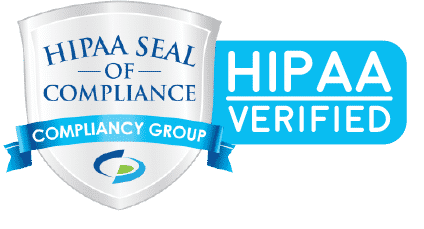Affordable HIPAA Compliance
Most HIPAA compliance programs are built for large companies, making them unaffordable for small to mid-sized businesses. This is why Compliancy Group built an affordable HIPAA compliance solution to service smaller organizations.
The Guard Affordable HIPAA Compliance Software
Compliancy Group’s affordable HIPAA compliance software, the Guard, simplifies compliance allowing you to confidently focus on your business. The Guard has everything your organization needs to build an effective HIPAA compliance program, that stands against the letter of the law. Completing our HIPAA compliance implementation process allows your organization to prove your good faith effort towards HIPAA compliance.
Compliancy Group understands that HIPAA compliance is difficult to navigate on your own. That’s why our team of Compliance Coaches™ are there every step of the way to guide you through the process. We take our customer service a step further by offering you full audit support if you are subject to a HIPAA audit.
Our Audit Response Team™ will provide you with all of the documentation requested by the Department of Health and Human Services’ (HHS) Office for Civil Rights (OCR). Working with Compliancy Group will give you the peace of mind that we have your back; we have never failed an audit on behalf of our clients!
About Our Process
- Self-audits: To measure your organization’s compliance with HIPAA, you must complete annual self-audits. There are six required audits for HIPAA covered entities (CEs), and five for business associates (BAs).
- Gap Identification and Remediation: Completing self-audits allows you to identify areas in which your safeguards are lacking. Gap identification enables you to create remediation plans to address deficiencies.
- Policies and Procedures: As stated above, policies and procedures dictate the proper uses and disclosures of PHI. Policies and procedures must be customized for your organization to apply directly to your business processes, and must be reviewed annually to account for any changes in business operations. Failure to customize policies and procedures leaves your organization vulnerable as PHI may not be fully secured.
- Employee Training and Tracking: Also mentioned above, employee’s must be trained annually on your organization’s policies and procedures, as well as HIPAA standards. Employees must legally attest that they have read and understand the material that they were trained on. The ability to track employees’ training ensures that all employees are trained in a timely manner.
- Business Associate Management: Organizations working with protected health information are required to vet their business associates. Vetting BAs ensures that they are protecting the PHI that they create, receive, transmit, maintain, or store on your behalf. You can vet your BAs by sending them a vendor questionnaire. Similar to self-audits, vendor questionnaires assess the gaps in the business associate’s safeguards. To work with the BA, the vendor must agree to address identified gaps with remediation efforts. If the BA is unwilling to implement remediation plans, you should choose another vendor to work with. Additionally, they must be willing to sign a business associate agreement (BAA). A BAA is a legal document that dictates the safeguards the BA must have in place. It also limits the liability of each signing party as it requires each party to manage their own HIPAA compliance.
- Incident Management: If your organization is the victim of a healthcare breach, you must report the breach. If the breach affects less than 500 patients, you are required to report the incident within 60 days from the end of the calendar year to affected patients and the Department of Health and Human Services (HHS). If the breach affects 500 or more patients, you must report it within 60 days of discovery to affected patients, the HHS, and the media.




